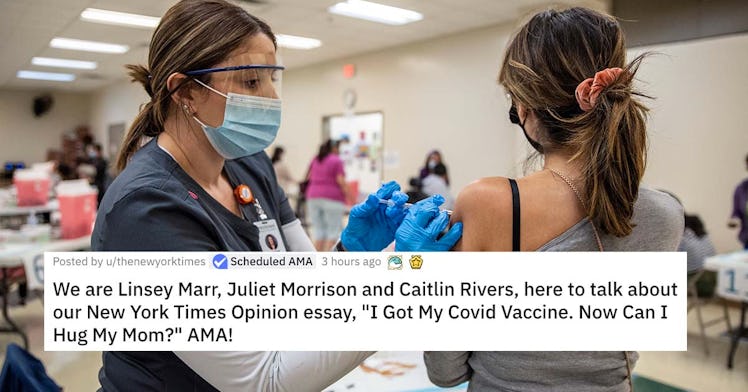Experts Say What You Can, Can’t Do Post-Vaccine in Viral Reddit Thread
Visiting the grandparents? Probably safe. Flying on a plane? It depends.

CDC officials released guidelines earlier this month explaining what’s safe to do once you’re vaccinated. But the guidelines left a lot of families with lingering questions. What can you do if you’ve received the COVID-19 vaccine, but your kids haven’t? Can you fly to see the grandparents? Can you travel, or eat at a restaurant inside? What about taking a summer vacation? To fill in the blanks, three COVID-19 scientists took to Reddit to host an AMA in a viral Reddit thread (Ask Me Anything) about what you can and can’t do post-vaccination.
The CDC guidelines make three major points about what you can do once you’re fully vaccinated, two weeks after your last dose. They are:
- If you’re exposed to COVID-19, you don’t have to quarantine or get tested unless you show symptoms.
- You can gather in small groups with other vaccinated people without masks or social distancing.
- You can meet up with unvaccinated people from one household at a time without masks or social distancing.
Obviously, there are a lot of gaps to fill in those guidelines. In a follow-up to an opinion article in the New York Times that aimed to do just that, the three authors — airborne transmission expert Linsey Marr, virologist Juliet Morrison, and epidemiologist Caitlin Rivers — took over the publication’s Reddit account to host an AMA.
Many of the questions came from parents. “how could we safely begin to introduce our 14 month old to family, friends, and “the world” (daycare, playdates, larger gatherings etc.)?” asked Reddit user JerSullivja21. “We are afraid of putting her at risk as vaccines for her age seem far off and she is too young to mask up.”
There are no cut and dry answers to these types of questions. “This is a gray area and I know it’s really tough for families to navigate,” Rivers responded. The experts can’t guarantee your safety, but they can put risks into perspective. “Young children are unlikely to be eligible for the vaccine this calendar year. The good news is that they are at low risk of severe illness. I have little ones and after weighing the risks and benefits, we decided to send them to childcare that we trust.”
Many of the people in the comments wondered about travel. User Gay_Deanna_Troi wanted to know whether it’s safe for vaccinated adults to fly to visit unvaccinated kids. Marr pointed out that the CDC still recommends against nonessential travel and urged the asker to be extra cautious if the children have underlying conditions. Morrison dropped some science to help ease your fears about the kids’ COVID-19 risk: “The most recent studies (as of last week) show that vaccinated people are unlikely to shed enough virus to actually spread it to others. It’s not 100%, but it looks like about 90% of vaccinated people are unable to spread the virus if they become infected.”
For safer long-distance visits, Marr had some recommendations. “If you choose to travel, the risk is relatively low in airplanes as long as everyone is wearing a mask. Planes have outstanding ventilation and filtration,” she wrote. “Hotels and rental cars should be fine. Minimize time spent in the hotel lobby and hallways, and try to avoid long lines at the rental counter.”
Reddit user shottawhiskey is excited to meet their new baby niece for the first time but doesn’t want to pass on COVID-19. River wrote, “Congratulations! I would recommend washing your hands before holding or touching the baby; that’s a good idea with very young children in any case. You could also consider wearing a mask and meeting outdoors or opening a window. I think that’s what I would do since it’s now habit, but if all the adults are fully vaccinated then I think there is flexibility there.”
Other questions were less child-centric. Some people just want to get back to eating in restaurants. Marr was less enthusiastic about that. “Indoor dining at restaurants remains one of the riskiest activities because you spend at least an hour with unmasked people in a potentially poorly ventilated setting,” she wrote. “The vaccines protect against hospitalization and death but there is still a small chance that you could come down with symptoms. I would wait another month or so until more people are vaccinated and the prevalence of the virus in the community is lower (hopefully).”
Still have questions? Check out this interactive quiz from the New York Times to assess the risk of various activities once you’re vaccinated.